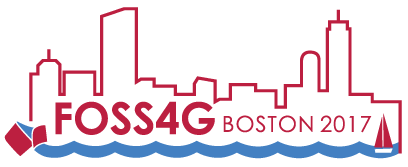FOSS4G 2017 Lessons Learned
Previous Years Lessons Learned
FOSS4G 2017 Lessons Learned
The Boston Team was thrilled to welcome the global OSGeo community and other interested parties to Boston in 2017. And we were extremely proud to set the attendance record of 1,150 people while also delivering strong financial performance with a surplus of over $115,000 returned to OSGeo, above and beyond full repayment of the advance that was provided to our Boston Local Organizing Committee (BLOC).
We benefited greatly from the guidance of past Chairpersons, and we look forward to sharing our lessons learned through this page. Our plan is to use a slightly different approach than some of the other material found on this Wiki. Indeed, we performed a lot of documentation and data collection in the process of producing the conference. As such, a good deal of the material we present will be links to shared Google documents and spreadsheets, with brief introductions and links presented on this page. And of course, we remain available to, and look forward to providing direct guidance to future conference teams beginning with Dar es Salaam and Bucharest.
This will be a work in progress over the coming weeks.
Logo
We hosted a logo contest to pick our FOSS4G Boston 2017 logo. The design criteria can be found here. The BLOC voted on their favorite design based on these entries, which is how we ended up with our beloved logo above.
Sponsorship
Knowing that Boston was a relatively expensive city, the Boston Team highly prioritized attracting sponsors as an important revenue source to help defray the costs. In addition, sponsors are incredibly important partners who help drive attendance to the conference and their speakers provided rich and invaluable content to our program. Our Sponsorship Committee as well as the Co-Chairs directly worked hard to engage with sponsors, hear their needs and design a program that would be attractive to them.
We are extremely proud, and grateful to our sponsors, that we were successful. Indeed, sponsors contributed $273,000 of funding support to Boston. Thank you. Thank you. Thank you.
LOC Organization
Michael Terner was Conference Chair
Guido Stein was Conference Co-Chair
Our Boston Local Organizing Committee, as known as The BLOC, is described on this page from our website:
http://2017.foss4g.org/about/#bloc
Marketing
Discounts
Travel Grants
Abstract Submissions
Our Call for Presentations opened on February 3, 2017 with a final abstract submission deadline of March 21, 2017. We promoted our Call for Papers heavily through both Twitter and our regularly distributed newsletter. We were pleased that this promotion was successful and by the deadline we had received 411 abstracts and thus did not have a need to extend our deadline.
Our original "Call for Presentations" can be found on this page of our website:
http://2017.foss4g.org/call-for-presentations/
This Google Spreadsheet provides the week-by-week tracking of how abstracts were submitted over time, as well as a chart that indicates the flow of abstracts over time. Spoiler alert: the vast majority of abstracts were submitted in the 1 week preceding the deadline.
Paper selection
The Program Committee, Chaired by Andy Anderson, led the paper review and selection process. With a very large volume of 411 submitted abstracts having a fair and equitable process that helped to create a diverse program - both in terms of human diversity and program diversity - was essential.
This blog by Conference Chair, Michael Terner, provides an overview of our goals for a diverse program as well as the process and some of our challenges:
http://2017.foss4g.org/program/abstract-review/
This blog by Program Committee Chair, Andy Anderson outlines many of the details and finer points of our process and abstract scoring:
http://2017.foss4g.org/program/abstract-selection/
Workshops
Academic Track
Code Sprint
Other side events
Harpoon Brewery Welcome Social
As our attendance numbers grew, we began to realize that we would exceed building capacity for the Harpoon Brewery. For this reason we limited the event to those who signed up for Early Bird (this also helped raise our Early Bird registrant numbers). After making this constraint and looking at our numbers, we noticed that we were still above building capacity. This is when we decided to create an Academic event, for those who wanted to connect with other academics and who would prefer this event over the Harpoon Brewery. We also split the Harpoon event into two time slots and gave the academics a choice to do both events. By doing so, we were able to accommodate all of the Early Bird registrants at this event.
